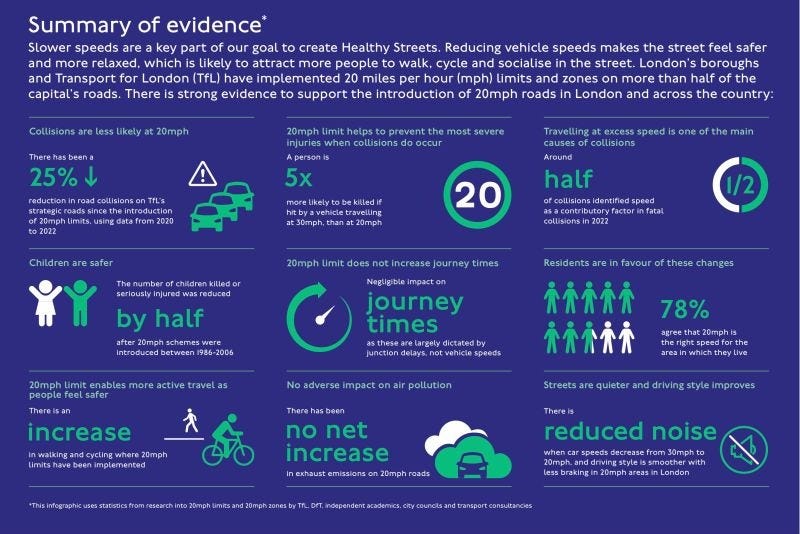20mph speed limit is saving lives
Barnes and Mortlake adopted these new speeds in 2020. It was worth it - story 78
A major review by Transport for London (TfL) has found that lowering speed limits to 20mph on key city roads has led to a significant reduction in road casualties adding fresh momentum to efforts to aimed at improving safety for all road users.
The report, published this week, shows a 34 percent reduction in collisions following the rollout of 20mph limits across large sections of the TfL-managed network. The number of fatalities also dropped, with nine people killed in the most recent period studied, down from a projected 15.

The BBC has a full explanation of the background and findings.
The motivation for this change was the Mayor’s Transport Strategy which included Vision Zero, the policy designed to reduce road casualties to zero.

Will Norman, London's Walking & Cycling Commissioner, has more details here.
Not every one was happy.
The TaxPayers’ Alliance have argued that blanket 20mph zones may ‘risk punishing responsible drivers without delivering clear value for money’, suggesting that such measures could lead to increased congestion and reduced productivity, particularly affecting tradespeople and small businesses .
Similarly, the Licensed Taxi Drivers’ Association has labeled the expansion of 20mph zones as ‘devastating’ for black cab drivers, implying that these limits adversely impact their operations.
Notes & thoughts
Gareth Roberts, leader of Richmond Council, in a punchy editorial in the Standard explained how the council introduced the new speed limits ‘with a handful of exceptions’ across the borough in 2020. He recalls the backlash. Some said there would be longer journey times. More pollution. Worse congestion.
The TfL report vindicates the change, Councillor Roberts says. He ends with a pointed question for drivers who continue to oppose 20mph:
Why should your personal desire to drive at 30mph, just because you want to, be anywhere near as important as ensuring a child gets home from school safely?
Credit is due to Councillor Roberts for taking a stand. The decision marked one of the most significant challenges to the car-first status quo in recent memory—arguably more consequential than the expansion of London’s ultra-low emission zone or even the introduction of the congestion charge. It should embolden those advocating for the next phase of reform.
It is also a timely reminder of the role that elected officials play in shaping public priorities. Politicians cannot solve climate change alone, but they can shift the terms of debate—and adjust expectations accordingly. That is no small task, though it is surely easier than living with the unchecked consequences of global warming.
Richmond Council’s willingness to combine carrots and sticks in this instance is welcome. The same mix of ambition and pragmatism will be essential if its broader transport strategy is to succeed.


